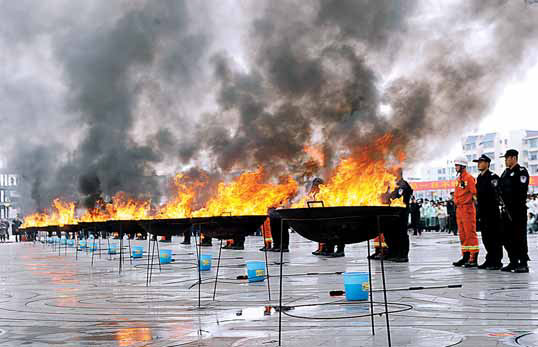Harsher laws proposed for drug crimes
By Hu Yongqi (China Daily) Updated: 2014-03-12 07:27
 |
| Police in Ningming, Guangxi Zhuang autonomous region, burn 1 metric ton of confiscated narcotics on Monday. The drugs, including heroin, were seized along the China-Vietnam border since the start of 2013. LI BIN / XINHUA |
Considering the increasing number of drug smuggling cases and addicts in border areas, deputies to the National People's Congress have proposed stricter laws and a standard operation for sentencing suspects, especially in places such as Yunnan province and the Guangxi Zhuang autonomous region.
Last year, the Yunnan High People's Procuratorate authorized approvals to arrest 7,853 suspects and filed suits against 7,530 drug dealers, according to the procuratorate's report released in January. During the local sessions of Yunnan in late January, Zhang Xuequn, president of Yunnan Higher People's Court, said courts in the province handled 5,188 cases involving drugs and sentenced more than 5,020 suspects.
Wang Tianhai, an NPC deputy and the chief procurator of the Yunnan High People's Procuratorate, said the verdicts are frequently less harsh for those in non-border provinces or autonomous regions than in Yunnan, due to the unusually large number of drug-related suspects in Yunnan.
However, the verdicts issued to drug dealers in Yunnan mainly depend on the social consequences and judgment of courts. There is no unified standard on how drug dealers should be sentenced, he said.
"A suspect with the same amount of drugs could receive the death penalty in eastern or central China, but only get several years in jail in Yunnan," Wang said.
Since 2005, Yunnan has launched three campaigns against drug abuse and illicit trafficking. However, the 4,060-km border Yunnan shares with three neighboring countries - Myanmar, Laos and Vietnam - makes it a difficult to stop illegal drug trafficking.
"The long border Dehong shares with Myanmar gives the suspects an excellent chance to sneak drugs into our country," said Yang Yan, an NPC deputy from the United Front Work Department of Dehong Dai and Jingpo autonomous prefecture in southern Yunnan. "The government and judicial system should punish them with an iron hand."
Wu Dongli, an NPC deputy and also director-general of the Border Control Department of the Ministry of Public Security, said the 100,000 border defense police officers nationwide will stand firmly against drug trafficking, especially the 13,000 officers stationed in Yunnan.
Drug dealers have adopted new ways to transport drugs and avoid police checkpoints, and so laws governing the area must keep pace. Wu proposed enacting a new law to punish those who help make and ship illegal drugs.
The Criminal Law clarifies the punishment for smuggling, selling, trafficking and making drugs. However, it does not specify the penalties for those who facilitate drug dealers in the manufacturing and trafficking of narcotics. "The two behaviors were found hard to handle in practice because of lack of clear provisions, and I suggest the Criminal Law aid the two situations and the penalties," Wu said in the proposal.
Meanwhile, Wu said the Criminal Law stipulates that those who smuggle and illegally trade drugs could receive sentences ranging from three to 10 years in jail, much shorter than the penalties in Singapore and the United States, where the maximum sentence for similar offenses is 20 years. "The lenient punishment won't stop drug dealers and others from getting into the business," Wu said.
Wu proposed raising the maximum prison term for drug makers to a life sentence, to effectively deter potential criminals.
Guo Anfei contributed tothis story.
huyongqi@chinadaily.com.cn
- More female officials caught in corruption
- Whampoa veterans recorded with glory
- Police bust 9 terrorist groups in Xinjiang
- Knife-wielding attackers seized in Xinjiang
- New regulation leads to drop in petitioned cases
- Hunan plant shut as probe into lead poisoning begins
- Police boost efforts to combat gambling
- Project offers jobs openings to legal experts
- Experts: Dog meat festival 'illegal'
- Nation looks to upgrade
pipeline networks






